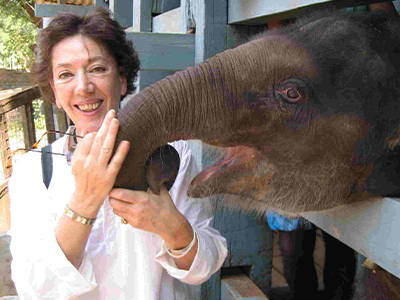Danielle Haase-Dubosc, 1939 – 2017
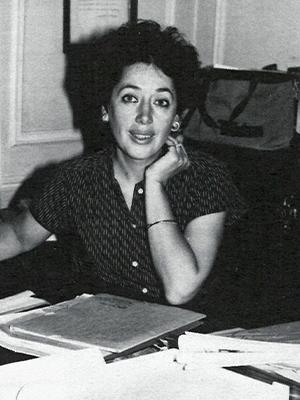
Danielle came to Reid Hall in 1972 after obtaining her PhD in Comparative Literature from Columbia University. She retired from her administrative duties after almost thirty years in 2010. Her directorship was flanked by two significant periods of transition at 4 rue de Chevreuse: the first in 1964, when Helen Rogers Reid donated the facility to Columbia University; the second in 2010, when Columbia University established one of its Global Centers at Reid Hall. But while Danielle’s beginnings were fraught with administrative turmoil, budgetary issues, and the alarming prospect of the property being sold, when she retired, the budget was in fine shape, numerous academic programs were permanently settled at the Center, and the future could be built on the solid foundations she had established.
When Reid Hall was donated to Columbia University in 1964 by Helen Rogers Reid, it was still used as a residence for students from US-based colleges and universities who had come to France to study French language and civilization. Progressively, under the guidance of professors Bert M-P Leefmans, Bob Paxton, Nathan Gross, and Provost Theodore de Bary, Reid Hall abandoned its residence and dining facilities to become the headquarters for French and American educational institutions. Danielle was named Resident Director in 1975 and she helped in establishing Science Po’s Centre de Recherche Internationale, which remained on-site through 2000. Thanks to the bequest of an endowment fund by Edith Sterling Currier, she was also able to initiate a program of French-American conferences and artistic activities that intersected cultural borders and academic disciplines.
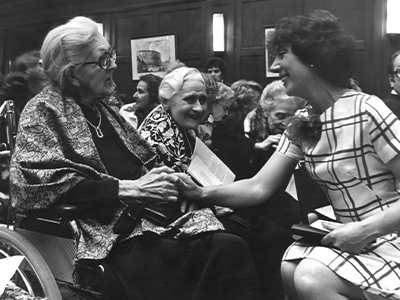
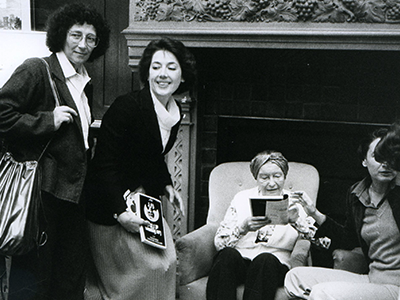
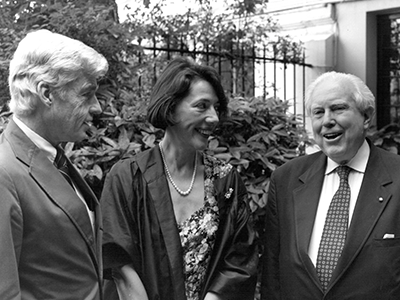
Beginning in 1972, Danielle also headed and taught in Columbia’s undergraduate study abroad program, whose offerings gradually expanded to include not only French language and literature, but also art history, music, architecture, history, and the social sciences. She was a study-abroad pioneer in forging international exchange agreements with French universities who welcomed Columbia students into their classrooms. The initial agreement with Paris VII (in the early 1970s) was followed by partnerships with Paris I, Paris IV, and Sciences Po. Under her leadership, Columbia’s undergraduate study-abroad program grew from 31 students in 1972 – 1973 to 143 in 1984 – 1985, when Brunhilde Biebuyck joined the team as Assistant Director of Studies.
Danielle recalled those first years in her 2014 allocution at Reid Hall’s fiftieth anniversary as a Columbia University educational center:
When I think of my years at Reid Hall, what comes to mind are the first students that Columbia sent to us and who wiped the floor with me. We had a lot of fun and they often surprised me with their good humor and their determination to learn everything, to know everything. The first team of teachers, Jacques Lecarme, Bruno Vercier, Simone Lecointre, and all the others that I cannot name here, were wonderful. I used to hold up a little red book, not Mao's manual, but the metro map of Paris. With this one you couldn't get lost! At Columbia, I benefited from the advice and support of professors and administrators alike: Bert M-P Leefmans, and Theodore de Bary were the first to help me, then Robert Paxton and Jonathan Cole took over. I must also mention the benevolence and expertise of Dean Frank Wolf. Without them, nothing would have been possible. In Paris, I gradually built up a strong team that brought new ideas and opened new paths. Inter-university agreements expanded the range of courses for American students and gave some French students the opportunity to spend a semester or a year at Columbia. We were pioneers in the world of student exchange (translated from the French).
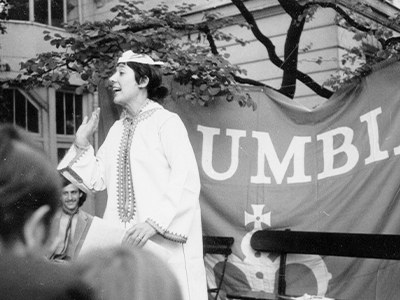
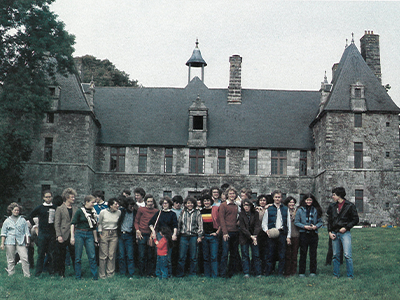
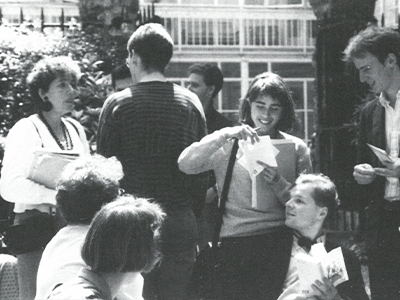
Enrollments continued to soar over the next decades, with an average of 200 students at Reid Hall each year, including a widely popular summer program, which began in 1983. In addition to growing the Columbia program, Danielle also invited other institutions to become members of Reid Hall: Smith College, Hamilton College, Southern Methodist University, Hollins College, University of Delaware, Sarah Lawrence College, University of Florida at Gainesville, and a joint Vassar-Wesleyan program, all developing their own curricula and sharing the property in collegiality. By 2010, more than 800 American undergraduates were studying at Reid Hall each academic year. In recognition of her significant contribution to undergraduate education at Columbia University, she was named Associate Provost in 1987.
Danielle was not solely committed to undergraduate education. She sought to further the mission set forth by the Reid family when they entrusted the property to Columbia, which was to develop a range of diverse undergraduate, graduate, and research programs. She was convinced that study-abroad should not be limited to a parenthetical “junior year” but that one should be able to return as a Master's student, a PhD candidate, or even a junior or senior scholar, benefiting at each level from the rich networks and abundant resources that Reid Hall had cultivated.
In 1987, a grant from the Florence Gould Foundation, allowed the creation of a Graduate Research Institute for PhD students working on their dissertations in France. This highly successful program attracted an average of thirty researchers each year, who benefited from seminars in French language, research methods, and theoretical skills. They were also introduced to the various documentation centers, archives, and academic institutions in France. The Institute unfortunately closed in 1995, when the funding needed to sustain it was no longer available. Danielle also inaugurated the Master's in French Cultural Studies in 1993, the first free-standing MA of its kind offered by an American university in a foreign country. It has evolved into the the Master's in History and Literature, a program co-run by Columbia's Departments of History and French, attracting an average of 15 students per year.
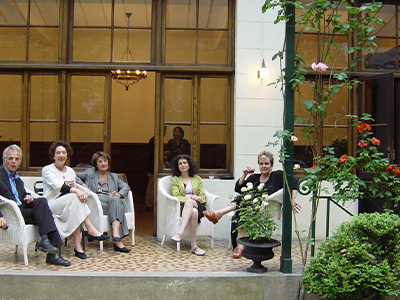
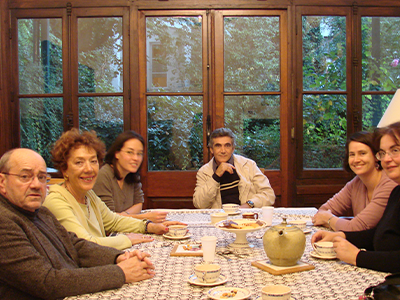
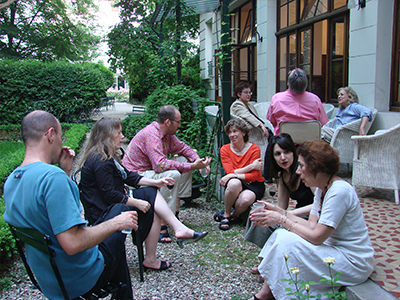
In 2000, in collaboration with then-Provost Jonathan Cole, she launched the Columbia Institute for Scholars, welcoming fellows from Columbia University and institutions of higher learning in the US and other parts of the world. They benefited from offices, conference spaces, and meeting rooms, and engaged in individual and collective research at Reid Hall. This Institute ceased operations in 2010, though it was reincarnated in 2018 as Columbia's Institute for Ideas and Imagination.
Despite her numerous administrative responsibilities, Danielle pursued her scholarly activities by publishing books, articles, and attending conferences in many parts of the world. She was a co-founder of the Société Internationale pour l'Étude des Femmes de l'Ancien Régime (SIEFAR) and was an active, vocal supporter of feminist causes, namely parity within the political realm.
Throughout her long career, Danielle strove to enhance Reid Hall’s position in cultural and academic exchanges by fostering activities that were deeply rooted in French-American reciprocity. From her perspective, “the imposition” of an American model (or any other national model) had to be avoided so that an authentic intellectual community could prevail. The various programs she established at Reid Hall brought together students and scholars with outstanding academic and personal profiles. Renowned French professors taught in these Columbia programs, where junior scholars also found space, paving the way to innovative discourse and research. More than a set of buildings, Reid Hall became, under Danielle's leadership, an environment where students, faculty, and researchers defined life goals or refined their career paths.
Even before the emergence of the Columbia Global Centers in 2009, Danielle had already outlined the future of higher education and global engagement, positioning Reid Hall as the hub for Columbia’s immersion in Europe. In short, she laid the crucial groundwork for many of the directions in which Reid Hall is now heading.
Danielle Haase-Dubosc died suddenly on November 12, 2017. The memorial service to commemorate her 38-year stewardship as Director of Reid Hall drew a large number of colleagues and friends. See the allocutions by Mihaela Bacou, Antoine Compagnon, Catherine Healey, Elisabeth Ladenson, and Susannah Mowris.
